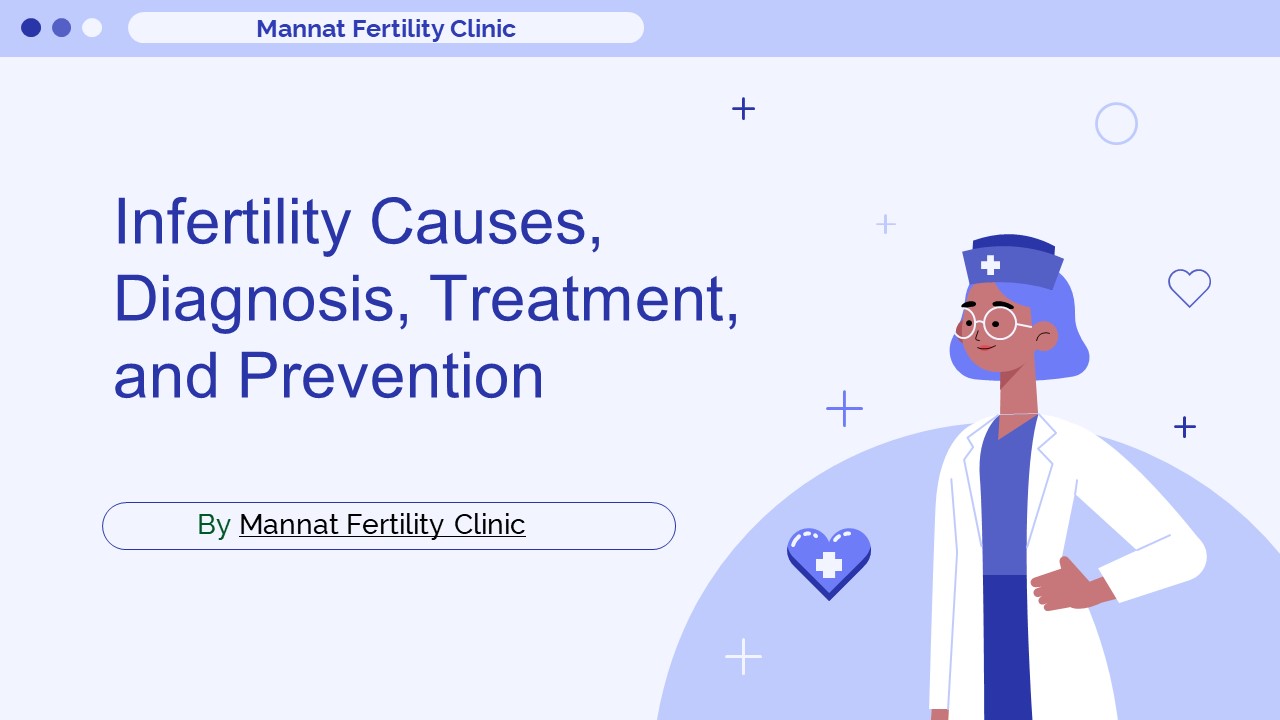Infertility Causes, Diagnosis, Treatment, and Prevention (1) - PowerPoint PPT Presentation
Title:
Infertility Causes, Diagnosis, Treatment, and Prevention (1)
Description:
"Infertility affects a lot of people. As per a September 2020 WHO report, the world has approximately 48 million couples and 186 million individuals with fertility problems.It happens to both males and females as they age. In their 20s and early 30s, males and females are highly fertile. They can notice a decline in their fertility after 35. The primary symptom of infertility or fertility problems is not having a concept after unprotected sexual intercourse. " – PowerPoint PPT presentation
Number of Views:19
Title: Infertility Causes, Diagnosis, Treatment, and Prevention (1)
1
Infertility Causes, Diagnosis, Treatment, and
Prevention
- Mannat Fertility Clinic
- By Mannat Fertility Clinic
2
Overview
- Mannat Fertility Clinic
- Infertility is a reproductive health disorder
that prevents a couple from producing a child.
Couples know they have infertility when they are
unable to conceive a baby after making
unprotected love for more than a year. - Infertility affects a lot of people. As per a
September 2020 WHO report, the world has
approximately 48 million couples and 186 million
individuals with fertility problems.
3
Mannat Fertility Clinic
- Mannat Fertility Clinic
- It happens to both males and females as they age.
In their 20s and early 30s, males and females are
highly fertile. They can notice a decline in
their fertility after 35. The primary symptom of
infertility or fertility problems is not having a
concept after unprotected sexual intercourse.
4
In the following slides, have a look at
everything associated with infertility.
01
03
05
02
04
06
- Causes of infertility in females
- Causes of infertility in males
- Risk factors of infertility in males and females
- Infertility diagnosis
- Infertility treatment
- How to stay away from infertility
5
Causes of infertility in females
- Females have fertility issues due to several
reproductive health problems and allied things.
Here are some causes of female infertility - Ovulation disorders
- Uterine or cervical abnormalities
- Fallopian tube damage or blockage
- Endometriosis
- Chronic diseases such as cancer and STDs
- Pelvic adhesions
- Poor egg quality
- Early menopause
- Age
- Family history of infertility
6
Several factors cause infertility in males. The
primary cause of male infertility is the problems
with semen and sperm. Low sperm count, poor
motility, shape, and concentration pave the way
for having fertility problems.
- Causes of infertility in males
7
- Causes of infertility in males
- Other causes of infertility in males are as
follows - Family history of infertility
- Mumps
- Hypospadias
- Chemotherapy or radiation therapy to treat cancer
- Cystic fibrosis
- Chronic diseases such as diabetes, anaemia, and
thyroid - Medications such as anabolic steroids and
sulfasalazine
8
- Risk factors of infertility in males and females
- Apart from reproductive health issues, several
other things trigger the risks of having
fertility problems. Here are some common risk
factors - Age (over 35 for females and over 40 for males)
- STIs such as syphilis and gonorrhoea
- Eating disorder
- Lavish lifestyle with no physical activity
- Smoking and drinking
- Stress
- Extreme exposure to heat and industrial chemicals
- Over exercising
- Substance abuse
- Underweight or overweight
9
- Infertility diagnosis
As a couple, you should consult a respective
doctor if you are over 35 and you have not
conceived after having unprotected physical
intimacy for more than 6 to 12 months.
10
- Infertility diagnosis
- Your doctor will do physical examination and
recommend a few tests that could be - Pelvic exam
- Blood test (for both of you)
- A record of basal body temperature and cervical
mucus (in the case of ovulation disorders) - Transvaginal ultrasound
- Saline sonohysterogram
- Hysteroscopy
- Laparoscopy
- Hysterosalpingogram (HSG)
- Semen analysis (for male partner)
- Scrotal ultrasound (for male partner)
11
- Infertility treatment
After going through the recommended test results,
your doctor knows whether you or your spouse have
fertility problems. As per the findings, the
doctor will treat your infertility with medicines
and surgeries.
12
- Infertility treatment
- The expert can advise the following treatment
options to you - IVF (in vitro fertilisation)
- IUI (Intrauterine insemination)
- ICSI (Intracytoplasmic sperm injection)
- Egg/Sperm donor program
- Surrogacy if the female partner is unable to bear
pregnancy due to age or reproductive health
issues - Adoption (last option)
13
- How to stay away from infertility
- You can keep your fertility problems at a bay by
following a healthy lifestyle. Here are some
useful steps to prevent infertility - Keep fertility clock in mind and try to become
parents in early 30s - Say no to smoking and tobacco products and
illicit drugs - Keep your body weight in control as per your BMI
(not below than 20 and higher than 25) - Do workouts of light to moderate intensity for
20-30 minutes a day and 5 days a week - Avoid drinking or bring it to a light level (a
peg a week) - Avoid having multiple sexual partners
- Stay away from a longer exposure to extreme heat
and industrial chemical - Eat a healthy and balanced diet every time
- Lower your stress level through meditation or
deep breathing - Wear loose or comfortable undergarments and avoid
wearing the tight one - Try not to place the laptop on your lap for an
extended period
14
(No Transcript)
15
Do you have any questions ?91 87629
25555mannatclinic_at_gmail.comwww.mannatfertility.c
om
- Mannat Fertility Clinic

